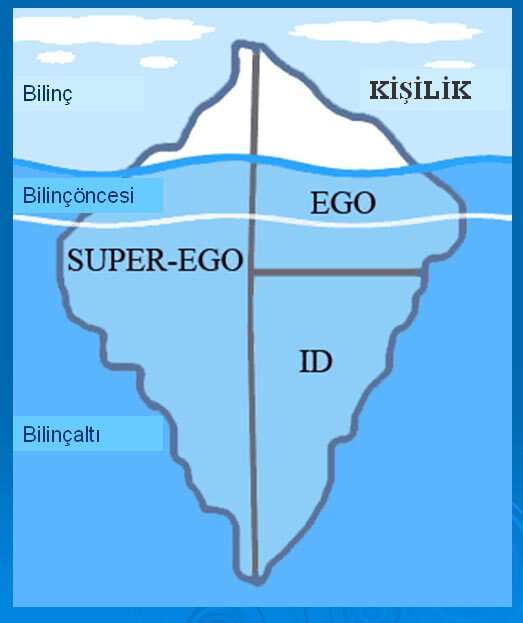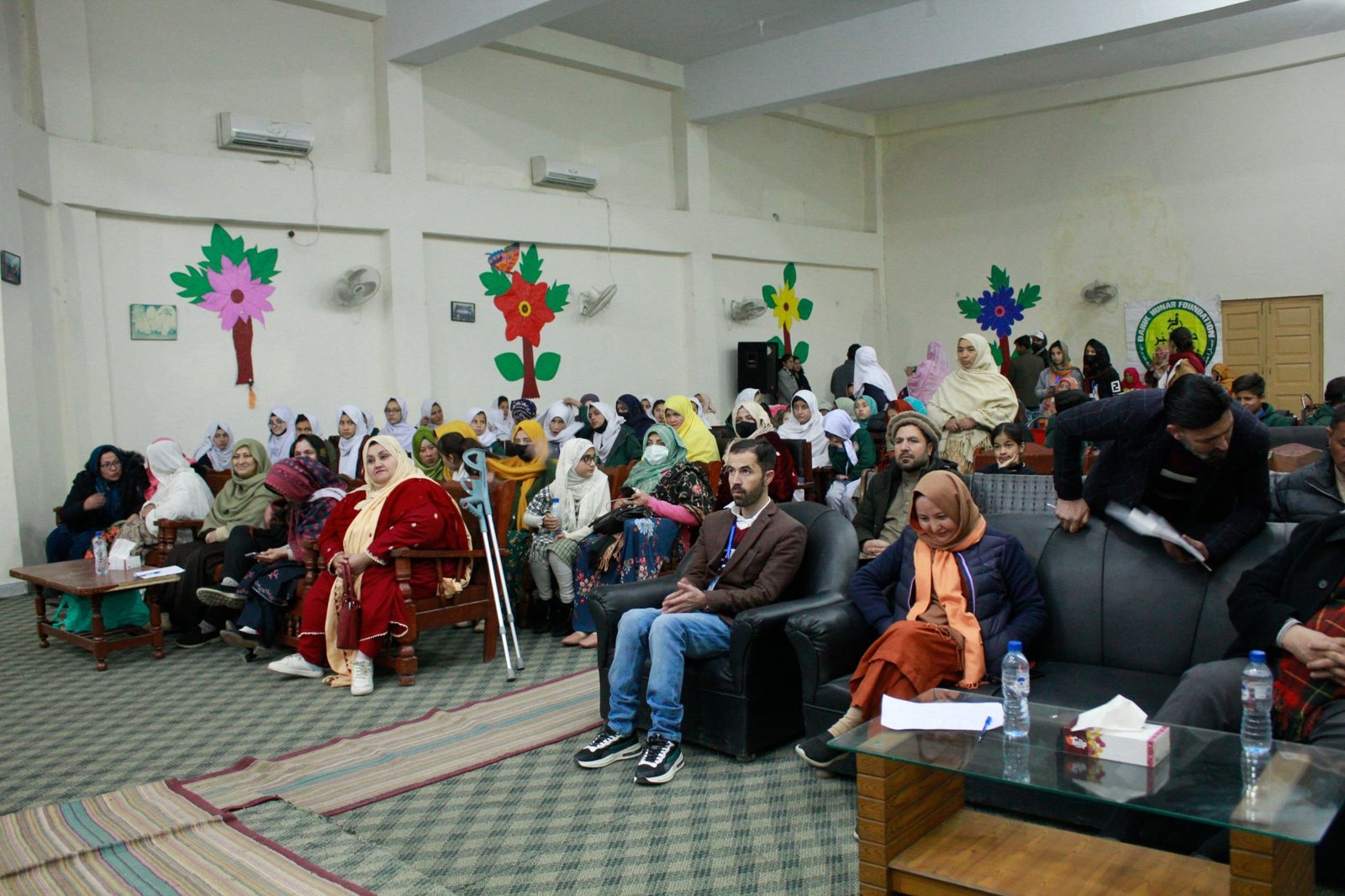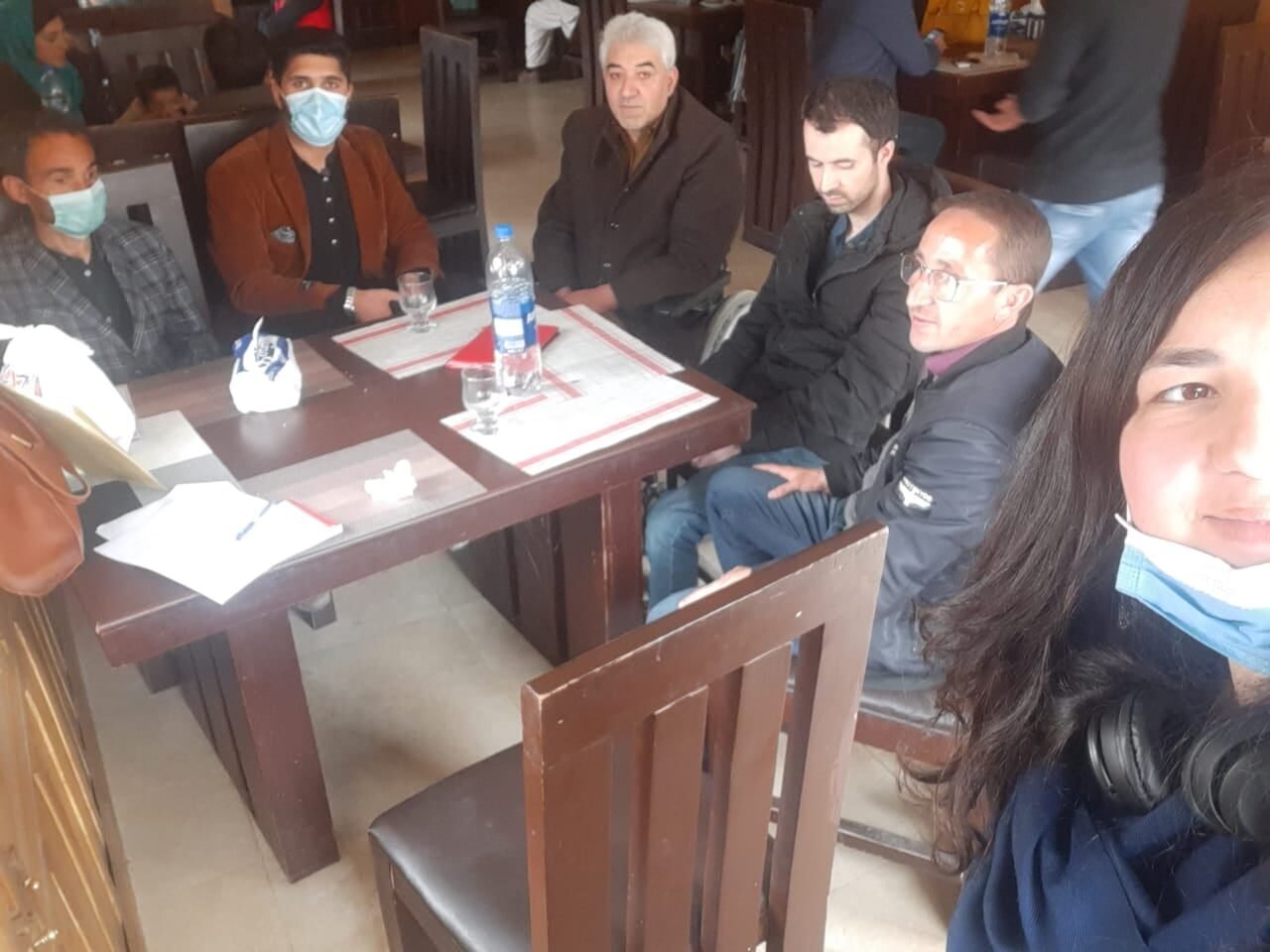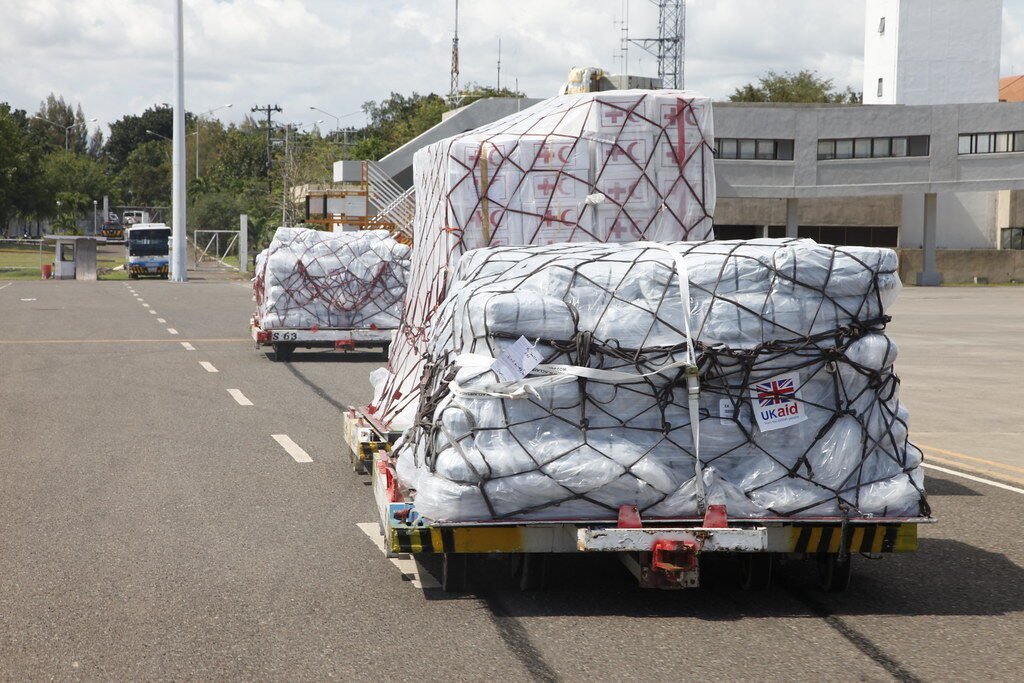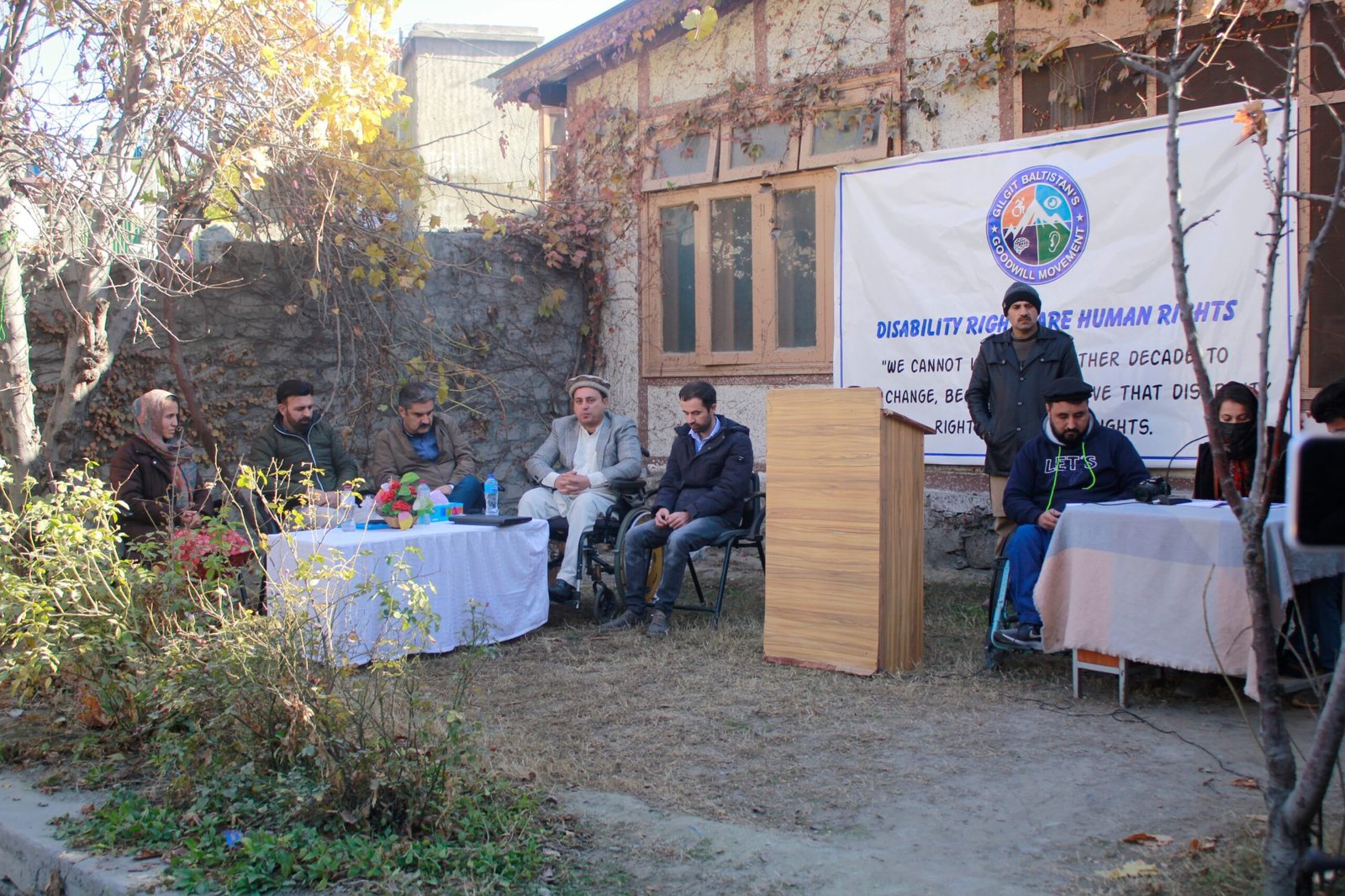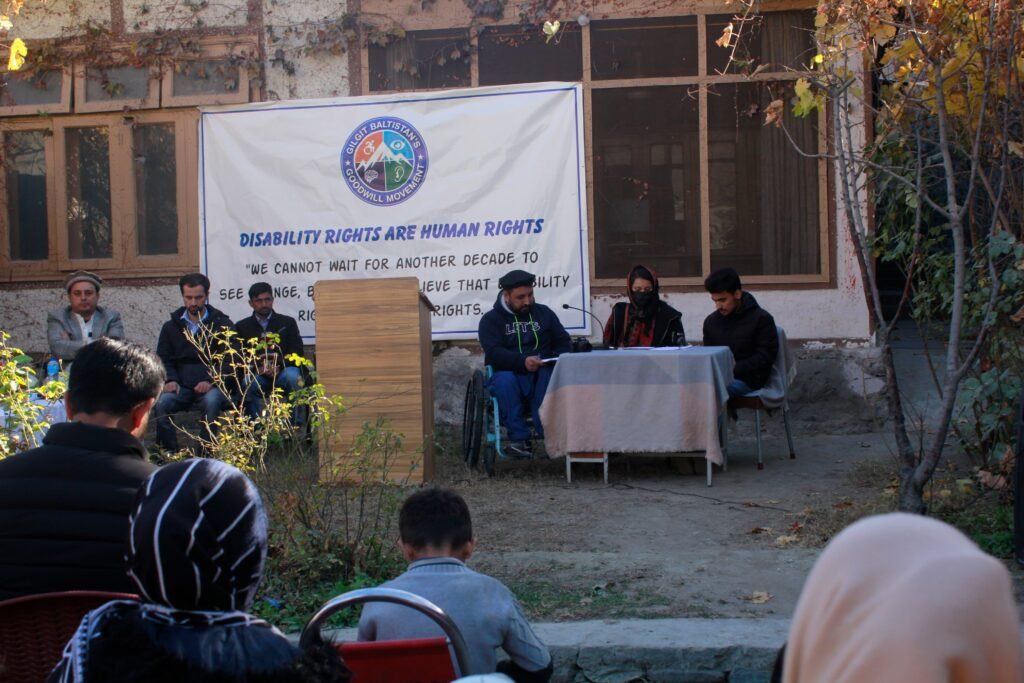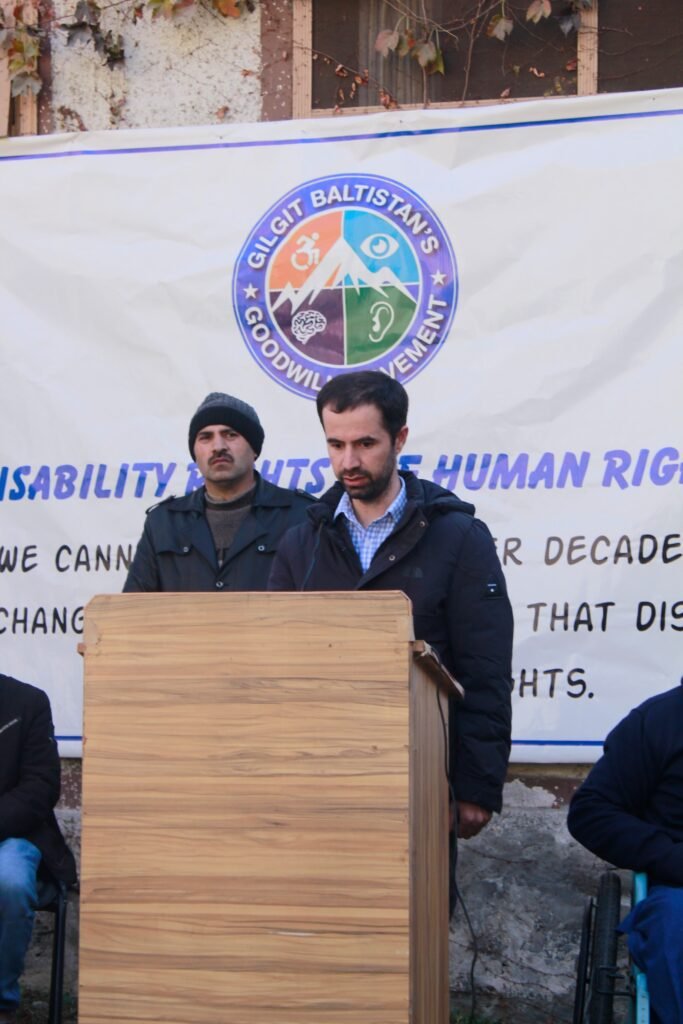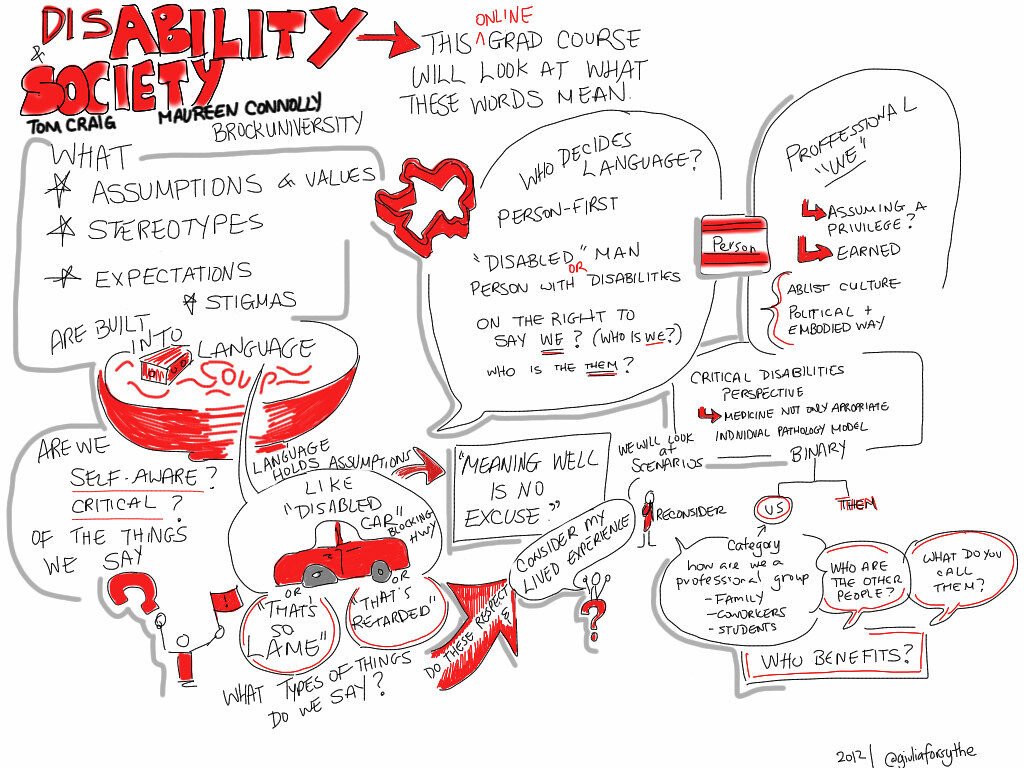Tag: human rights
Can You See Us? Breaking the Walls of Exclusion in Gilgit-Baltistan
Stop for a moment and picture the mountains here in Gilgit-Baltistan. They are stunning, right? But sometimes, behind that incredible beauty, there is a heavy silence the silence of a community that feels forgotten.
I’m talking about our Persons with Disabilities (PWDs). For them, life is not just about the natural hardship of living in the mountains it’s about a constant, grinding battle against a world that simply was not built for them.
It’s More Than Just a Lack of Ramps. It’s About Dignity.
Imagine trying to live your life when every public space the school, the bank, the clinic is a barrier.
It’s heartbreaking: there are virtually no accessible facilities. No ramps, no suitable bathrooms, and no easy way to get around. This is not just an inconvenience it’s an invisible wall that shouts, “You don’t belong here.” Our friends and neighbors are not disabled by their conditions they are disabled by our society.
And the struggle does not end there:
- No Education, No Future: Many kids can not get an education because local schools are not set up to help them. Without skills, without a degree, they have no hope of a job. They are trapped, and their entire family suffers with them.
- Laws That Don’t Matter: We have laws on the books that promise rights, jobs, and protection, but they are empty words. They are not enforced, and so the people who need them most are left vulnerable, with nowhere to turn.
The Gilgit-Baltistan’s Goodwill Movement: We Won’t Let Them Be Forgotten
That’s why the Gilgit-Baltistan’s Goodwill Movement (GBGM) exists. We are led by people who have lived this struggle, and our mission is simple: We want to make sure every single person here is treated with dignity, has equal opportunity, and can live a full life.
We are not just giving out charity we are investing in human potential.
- Real Skills, Real Jobs: We provide free training teaching digital skills, crafts, and trades. We are turning helplessness into hope, and dependency into self-respect.
- Essential Lifelines: We pay for the things that are too expensive for families to afford: crucial medicines, healthcare support, and devices like wheelchairs, white canes and hearing aids that are literally life changing.
- Our Voice, Their Rights: We are constantly fighting and advocating. We stand up to authorities, demanding that the laws meant to protect PWDs are finally put into action.
This Is Where You Come In. This Is Your Chance to Help.
When you support GBGM, you are not just clicking a “donate” button. You are personally lifting the weight off someone’s shoulders.
You are giving a student a chance to learn. You are giving an artist a way to earn a living. You are giving a family the comfort of knowing their loved one will get the medicine they need.
We can not change the whole world overnight, but together, right here in Gilgit-Baltistan, we can change everything for the people who need us most.
join our movement. Help us break these chains of exclusion and prove that goodwill is not just a kind thought it is an action that saves lives.
Working with Donors – Challenges and diffculties
Working with Donors: Challenges and Difficulties
Engaging with donors is vital for non-profit organizations, as they provide the financial foundation necessary to drive meaningful change. However, working with donors often comes with its own set of challenges, requiring careful planning, persistence, and the ability to align their interests with the mission of the organization.
When I started the Gilgit Baltistan’s Goodwill Movement, the primary objective was to create a platform that could effectively engage donors and rally support for a greater cause: empowering marginalized communities, especially those with disabilities, in one of the most remote and underserved regions of Pakistan. The mission was born out of the realization that the existing support systems were inadequate and that sustainable change could only be achieved through collective responsibility and the involvement of compassionate contributors.
While supporting individuals like Amjad and many others facing daily struggles, I witnessed firsthand the transformative power of donor engagement. Every contribution, no matter how small, became a lifeline for individuals who had lost hope. However, the journey was not without hurdles.
Establishing trust with donors required consistent transparency, accountability, and storytelling that highlighted the real impact of their contributions. At the same time, navigating cultural differences, limited resources, and the logistical challenges of working in a geographically isolated area often tested the resilience of the movement.
Yet, these challenges also underscored the importance of perseverance and the need for innovative approaches to donor engagement. By creating awareness through social media campaigns, fostering personal connections, and demonstrating measurable outcomes, the movement was able to inspire a growing network of supporters dedicated to uplifting the disabled community in Gilgit Baltistan.
In reflecting on this journey, it’s clear that the heart of donor engagement lies in shared values and the belief that even the smallest acts of generosity can create ripples of change.
To address this, it became clear that transforming the Gilgit Baltistan Goodwill Movement into a formal registered charity was essential. Establishing a structured and transparent framework would not only enhance credibility but also provide donors with the assurance that their contributions were being managed responsibly and effectively. A formal charity would allow us to implement rigorous accountability measures, present detailed financial reports, and demonstrate the tangible impact of their support on the ground.
This realization marked a pivotal moment for the movement. By transitioning into a formal entity, we aim to bridge the trust gap, foster stronger donor relationships, and attract sustainable funding for our initiatives.
Human Nature and Feelings
I do not feel the same way as a disabled person does.
Human nature is often driven by a selfish individual perspective, with emotional feelings shaped as social constructs that reflect how an individual is perceived and behaves within society. Inside that social construct, the “I, Me, Myself” drives our inner emotions of happiness, anger, and joy.
The psychologist Sigmund Freud explored this phenomenon through his theory of the human psyche, dividing it into three components: the id, ego, and superego. These components work together to influence human behavior and emotions:
- The Id:
- Represents the primal, instinctual part of the psyche.
- Operates on the pleasure principle, seeking immediate gratification for desires and needs, such as happiness and joy.
- Is inherently selfish and unconcerned with societal norms or consequences.
- The Ego:
- Acts as the rational, conscious part of the psyche.
- Balances the desires of the id with the constraints of reality and societal expectations.
- Manages inner emotions and helps navigate social constructs by aligning personal happiness with acceptable behavior.
- The Superego:
- Represents the moral conscience and internalized societal rules.
- Often in conflict with the id, as it strives for ideal behavior that aligns with cultural and ethical standards.
- Influences feelings like guilt or pride, shaped heavily by social constructs.
Freud’s framework suggests that the “I, Me, Myself” is a reflection of the ego’s negotiation between personal desires and societal expectations. Emotional states such as happiness, anger, and joy emerge as responses to this dynamic interplay. While our inner emotions may feel personal, they are often deeply rooted in the cultural and social frameworks in which we exist. We tend to think that the disabled – the less abled in some aspects of life are not influenced by this, and somehow, we tend to go into that social, medical, generous model of support.
While these emotions and feelings are valid, time and time again, to quote psychologists there are false premises that we as individuals have or keep.
Psychosis and disabled people
The Charity, Mind UK refers to Psychosis as Psychosis (also called a ‘psychotic experience’ or ‘psychotic episode’) is when you perceive or interpret reality in a very different way from people around you. Applying this to our study, it seems humanity may have entered an episodic state, failing to recognize that disabled individuals are human beings, equal in dignity and worth, rather than perceiving them as separate entities. Why?
Why, what, who and where?
Different traditions can have different contexts, but it is the WHO we are interested it in and why? One Reason is power, another reason could be fear, but more importantly it seems like that our emotions are dominated who we are. Yesterday, we had a discussion with someone, who says you and I share the same values, but it might not reflect others? While Freud’s work has been criticized as unscientific in modern psychology, it still offers valuable insights into the interplay between emotions, power, and societal constructs.
Toward a New Understanding
If we aim to break free from this episodic state, we must move beyond outdated perceptions and biases. Recognizing disabled individuals as integral members of our shared humanity requires re-examining the emotions, constructs, and power dynamics that shape our worldview. Only by doing so can we build a society that values equality, inclusivity, and mutual respect.
The need for rationale Vs cost benefit analysis. What donors miss and hit.
This is our perspective, and we acknowledge that others may have differing views, which are valid and welcome. I understand that our same logic might apply to many places and situations, but I invite you to consider this scenario for a moment. Imagine you’re in a position to allocate a donor’s contribution of £5000. You have a critical decision to make, one that requires a thorough cost-benefit analysis. You could choose to invest this amount in supporting a student’s foreign education, a long-term investment that may yield returns only 20 years down the line, and perhaps even then only equal to the original donation. Alternatively, you could use these funds for something with a more immediate impact, such as healthcare, social care, or essential community support. My concern lies in guiding donors toward considering not only what they think is valuable but also what communities in Gilgit Baltistan may need most urgently.
A wise adviser once shared that in the UK, every national government, public interest (PI) firm, and donor is motivated to invest in the disability sector. There is an understanding here that investing in disability services, accessibility, and social care creates inclusive societies, boosts the economy, and empowers individuals with disabilities to lead fuller lives. This begs the question: why don’t we see this focus in Pakistan, particularly in areas like Gilgit Baltistan? Why is there a lack of targeted private investment directed at improving the lives of disabled individuals, who face some of the most significant barriers to education, employment, and social participation?
While short-term projects funded by donors are undeniably beneficial to society, sometimes producing immediate visible changes, I believe it’s essential to consider a broader perspective. Simon Sinek once said, “be different,” and this concept applies perfectly here. Why not stand out by addressing areas of unmet need? Why not focus on groups that are often overlooked and marginalized, like disabled individuals, and invest in creating lasting, equitable change for them? Inequality rules the mind
Inequality rules the mind
There’s also an undeniable sense of disparity that colors this discussion—a feeling of imbalance. In Urdu, there’s a phrase that loosely translates to “lack of awareness,” which captures an attitude that may contribute to why disability support is so underfunded. It is as if these issues are taken for granted, brushed aside without full consideration of their importance. This lack of awareness perpetuates an unequal society where certain needs remain unmet simply because they aren’t prioritized.
Let us do a thought experiment. Picture yourself as an elite in the world. Picture yourself with money, maybe 2.5 M$ is your monthly salary. Now imagine giving that to a disabled person
Let’s take a moment for a thought experiment. Picture yourself as one of the world’s elites, enjoying a life of abundance, with a monthly income of $2.5 million. Now, imagine what it would be like to invest even a fraction of that income into the life of a disabled person—someone facing barriers to education, employment, and daily life that we often don’t consider in our day-to-day existence. A small portion of such wealth, directed thoughtfully, could profoundly change the life of a person who lacks access to basic resources.
This disparity, however, reflects something much deeper—a mindset shaped by inequality. There’s an undeniable sense of imbalance here, an outlook that often ignores or underestimates the importance of disability support and social inclusion. In Urdu, there’s a phrase loosely translating to “lack of awareness,” which encapsulates this very attitude. Issues that don’t directly affect us are often taken for granted, brushed aside without adequate thought. This “lack of awareness” can perpetuate an unequal society where certain fundamental needs are unmet, simply because they are not prioritized.
When we look at places like Gilgit Baltistan, we must ask ourselves why this lack of investment in disability support persists. In the UK, for instance, governments, public interest firms, and donors increasingly direct resources toward disability services, accessibility, and inclusive social care. There is a collective understanding that supporting these areas builds an inclusive society, strengthens the economy, and enables individuals with disabilities to contribute and live fuller lives. But in Pakistan, particularly in areas like Gilgit Baltistan, private investment in disability support is almost absent. Why?
While it’s true that many donors focus on short-term projects that offer quick, visible benefits to society, perhaps there’s room for a shift. Imagine what might be possible if donors could look beyond short-term gains and recognize the profound, lasting impact of investing in underfunded areas like disability support. As Simon Sinek suggests, we can “be different.” Standing out sometimes means focusing on areas that are often overlooked and marginalized, like the disabled community, and creating equitable, lasting change for them.
The choice between funding a long-term goal like a foreign education or addressing immediate community needs in healthcare and disability support isn’t always easy, yet it’s essential to recognize the profound impact that can be made by addressing urgent needs. By guiding donors to consider not only what they value but also what communities in Gilgit Baltistan may urgently need, we encourage a holistic approach to development—one that’s deeply rooted in the immediate realities of those we aim to support.
Students 2024 intake
Exciting News from GB Goodwill Movement!
We are thrilled to announce that admissions are now open for new students
GB Goodwill Movement is dedicated to supporting and empowering special persons through various programs and resources. Our mission is to help them lead fulfilling and independent lives.
• Educational Programs
• Vocational Training
• Community Integration Efforts
• Personalized Support Plans
If you or someone you know could benefit from our services, don’t hesitate to reach out. Together, we can make a difference!
![]() Contact Us:
Contact Us:
Email: goodwillprojectgb@gmail.com
• Phone: 0332 4534565
• Address: GBGM Near ISI HQ, Gilgit
Join us in our journey to create a more inclusive and supportive community.
Share this article to spread the word!
How the Journey of Goodwill Began
The term “Goodwill” typically refers to the act of doing good for others. However, the concept of “good” itself can encompass various dimensions, including both short-term and long-term benefits.
In the short term, “good” often refers to actions or behaviors that result in immediate positive outcomes, such as providing assistance, kindness, or support to someone in need. This could include acts like donating to charity, offering a helping hand to a friend, or volunteering in the community.
On the other hand, “good” can also extend to long-term benefits or consequences. This involves considering the broader impact of our actions over time, including how they contribute to the well-being, development, and sustainability of individuals, communities, and the environment. Long-term “good” may involve fostering relationships built on trust and mutual respect, promoting social justice and equality, or advocating for policies that benefit future generations.
From my take, I like most people refer to Goodwill as providing assistance, kindness etc. But what benefit is Goodwill to the other, remains a unanwsered question. Thinking about this more clearly
Goodwill is often associated with
Building Trust and Relationships: Acts of goodwill foster trust and rapport between individuals, organizations, and communities. When people feel supported and cared for, it strengthens the bonds between them, leading to more cohesive and supportive relationships.
Enhancing Reputation: Engaging in goodwill activities can enhance one’s reputation within communities, organizations, or industries. Positive actions and altruistic behavior are often remembered and respected, contributing to a favorable public image.
That is an ideal individualistic outlook but it does not include the other.
Certainly, let’s clarify:
A few examples of the goodwill initiatives undertaken by us at Goodwill in the past, approximately four years ago, include:
- Supporting Persons with Disabilities with Food Rations during COVID: During the COVID-19 pandemic, we provided food rations to individuals with disabilities. This initiative aimed to address the immediate needs of this vulnerable group during a challenging time, ensuring they had access to essential sustenance.
- Providing Shelter: We offered shelter to those in need, extending a helping hand to individuals who were experiencing homelessness or facing precarious living situations. This initiative aimed to provide a safe and secure environment for those who lacked adequate housing.
- Distributing Clothing: We distributed clothing to individuals who lacked adequate attire, whether due to financial constraints or other circumstances. By providing clothing, we aimed to ensure that individuals had access to basic necessities and could maintain their dignity.
It’s important to note that while these actions may have brought individual happiness to the recipients by addressing their immediate needs, they also contribute to the overall well-being and happiness of the community. By supporting vulnerable individuals and addressing social issues such as food insecurity, homelessness, and lack of clothing, these initiatives help build a more inclusive and compassionate society, ultimately benefiting everyone.
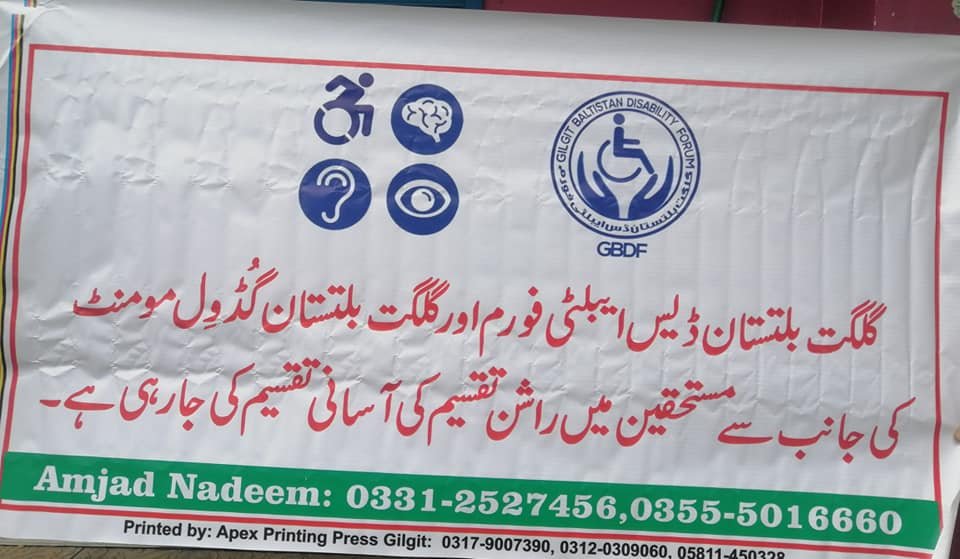
Certainly, let’s clarify:
Despite the positive efforts and intentions behind goodwill initiatives, it’s important to acknowledge that the state of being “good” or achieving universal goodness may not always be fully realized.
Several factors contribute to this and at that time my individualistic good did not realise, or did not want to realise the
- Complexity of Issues: Many social issues, such as poverty, inequality, and discrimination, are deeply entrenched and complex. Addressing these issues requires sustained effort, resources, and systemic change, which may not always be easily achievable through goodwill alone.
- Limited Resources: Goodwill initiatives often operate within constraints such as limited funding, manpower, and time. These limitations can impact the scale and effectiveness of interventions, making it challenging to address the root causes of social problems comprehensively.
- Structural Barriers: Structural barriers, such as institutionalized discrimination or systemic inequalities, can hinder the impact of goodwill efforts. Overcoming these barriers often requires broader societal and policy changes that extend beyond individual actions.
- Varying Perspectives: What constitutes “good” can vary depending on cultural, social, and individual perspectives. Differences in values, priorities, and beliefs may lead to conflicting interpretations of what actions are considered beneficial or ethical.
- Unintended Consequences: Despite good intentions, some goodwill initiatives may inadvertently perpetuate harm or reinforce existing power dynamics. It’s essential to critically assess the impact of actions and ensure they align with principles of justice, equity, and inclusivity.
While the pursuit of goodness and the practice of goodwill are valuable endeavors, achieving universal goodness is a complex and ongoing process that requires collective effort, critical reflection, and continuous adaptation. Recognizing the limitations and challenges is crucial for fostering meaningful progress towards a more just, equitable, and compassionate society.
I don’t feel the need to delve into this topic extensively because it’s already widely discussed on multiple blogs. However, I want to emphasize that Goodwill’s mission is to benefit people, and it does so through active community involvement. Goodwill operates with the belief that the community itself is instrumental in achieving positive outcomes. Unfortunately, society, especially from a sociopolitical standpoint, often overlooks or fails to fully grasp this crucial aspect of Goodwill’s work.”
In this revised version, the statement is more straightforward, ensuring the reader can easily understand the speaker’s perspective on Goodwill’s mission and its perception within society.
“If we don’t involve ‘the people’ directly, how can we accurately represent their voices? This principle is at the heart of what we stand for at Goodwill. We advocate for the full inclusion of disabled individuals as active participants in society, ensuring their voices are heard and valued just like anyone else’s.”
Maybe this is something to ponder upon during this festive period of Ramadan.
Our mission is theirs – GBGM and ICare Pakistan
Karachi 11.03.2024
On March 11, 2024, ICare Country Director Syed Hasan Ali and GB Goodwill Movement’s CEO Ghulam Muhammad Baig made a commitment to collaborate on supporting Persons with Disabilities throughout the holy month of Ramadan.
Director Hasan Ali expressed appreciation for GBGM’s efforts towards the differently abled members of society. He also affirmed that ICare Pakistan would provide support to GBGM’s operations on the ground wherever needed. This assistance would be facilitated through financial aid sourced from ICare’s donor network.
To support our cause through ICare, please click here
Collaboration is essential in society; without it, there would be no society. We hope that we can raise funds to benefit all disabled persons of Gilgit Baltistan.
Improving Governance Within the State – Aid allocation
In Pakistan and several other countries across South Asia, there are significant challenges with the allocation of aid. This aid primarily refers to funding directed towards Non-Profit Organizations (NPOs) and Non-Governmental Organizations (NGOs) engaged in various initiatives at the regional, provincial, or national levels. Despite the pressing need for increased social development aid, there persists a notable discrepancy in getting aid to the appropriate recipients in a timely manner. This challenge, however, does not primarily stem from corruption, lack of consideration, or a deficit of willpower. Instead, the primary culprit is disorganization.
Why Disorganization in Aid in Gilgit Baltistan?
In the context described, aid refers to the support received by Non-Profit Organizations (NPOs) and Non-Governmental Organizations (NGOs) from various sources such as governments, other NGOs, and agencies. While foreign monetary aid is a notable example, it’s not the sole form of aid. Instead, we’re focusing on how these organizations acquire support from different entities within their own country or from international sources.
In the West, aid is usually funded through open sources like DFID or UNAID or other forms. The aid is not given purely as a donation instead it has many steps where it asks one for their organisational information and so on. It even has many funding rounds (stages) of accquiring monteary funds. This allows one to approach each agency, and explain clearly what is needed and what is meant.
This is not the case in Pakistan.
- Limited Resources Distribution: When government funding is allocated without transparency or accountability, it can result in a few select NGOs receiving the majority of the resources, leaving others with limited support. This can hinder the overall development and impact of the NGO sector.
- Inequality and Unfair Practices: Without transparency, there’s a risk of inequality and unfair practices in the selection process for funding. NGOs that have connections or political affiliations may receive preferential treatment over others, regardless of their effectiveness or impact.
- Dependency on Government Funding: NGOs and NPOs becoming overly reliant on government funding can be problematic, especially when the funding allocation process lacks transparency. Dependence on a single funding source can undermine the independence and autonomy of these organizations, limiting their ability to pursue their mission effectively.
- Potential Solutions:
- Advocacy for Transparency: NGOs and NPOs, along with civil society organizations, can advocate for greater transparency and accountability in the allocation of government funding. This can involve lobbying for policy reforms that mandate transparent processes for funding distribution.
- Diversification of Funding Sources: Encouraging NGOs to diversify their funding sources can reduce dependency on government funding. This may involve seeking support from international donors, private foundations, corporate sponsors, and individual donors.
- Capacity Building: Providing capacity-building support to NGOs and NPOs can help them become more sustainable and resilient, reducing their reliance on government funding. This support can include training in fundraising, financial management, and organizational development.
- Networking and Collaboration: NGOs can also collaborate and network with each other to share resources, best practices, and advocacy efforts. Collective action can amplify their voices and increase their influence in advocating for fair and transparent funding practices.
Addressing these challenges requires collective action from NGOs, NPOs, government agencies, and civil society to promote transparency, accountability, and equitable distribution of resources in Pakistan’s development sector.
In Gilgit Baltistan, the NGO has tried to push the government away from this model, and we have reached somewhat success however much work is needed to bring Western model of foreign aid into good governance.
Conversing with Disabled Individuals.
We saw this LinkedIn Post about how people are said to be uncomfortable with disability. Rivera’s post and what was written in it reflected, if not all, the lives of disabled people in Gilgit Baltistan, Pakistan, and the World. Social media has not shown the difficulties of disabled people as it should.
Ableist Clickbaiting versus Disableist Seeking Rights?
We have often had to implement specific social media marketing tactics that were not our choice but society’s demands. Though we can not say that content creators do not have a right to clickbait, in our context, so much clickbait reinforces stereotypes that do not represent us.
The Psychology behind Conformity informs us that people, whether in Rome, Islamabad, or Gilgit, have been forced to think that disabled people can not do anything, can not achieve anything and are a burden on society ( which is very untrue) home.
Just because the Goodwill team reports on facts rather than distorted facts, it somehow gets lost in the Worldwide Web, which should not be the case. To put it simply, in an ideal world, content creators should be discussing these issues rather than fashion
Conclusion
Real-life issues should be discussed on social media, including Persons with Disablities. Much of the content on our website will come last, as much of the social media is clickbait. The issues discussed here are significant and foremost, as they dictate people’s livelihoods and opportunities within a society. People should view the stories as a glimpse of what reality means for disabled people of Gilgit Baltistan and other countries that our stories cover.
By putting fashion icons first, it seems that humans do not want to converse with disabled people on how an ableist has impacted their lives:
- Environment
- Culture
- Language
- The Social Make-up of Society
- 1
- 2

![WhoCares_BlackRed1[1]](https://gbgoodwillmovement.com/wp-content/uploads/2024/08/WhoCares_BlackRed11-1052x406.gif)
